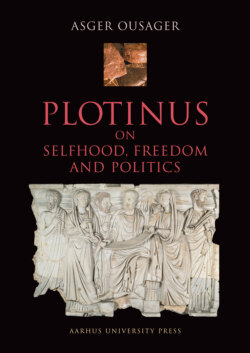Читать книгу Plotinus - Asger Ousager - Страница 5
На сайте Литреса книга снята с продажи.
Introduction Selfhood
ОглавлениеWhat is an individual according to Plotinus, and is the individual (pre)-determined or free?
My investigation tries to answer these essential questions by first analysing what distinguishes persons from each other. Plotinus raises this issue several times and it is also presented as a peculiar Plotinian problem by several scholars, for instance, Étienne Vacherot, Henry Blumenthal and most recently Gabriela Carone and Richard Sorabji. The difficulty has three subsections:
A. If particular souls are all parts of Soul and are, in one phase of their mystical ascent at least, to be identified with the Soul as such, what still differentiates them from each other?
B. If human souls with their particular intellects are all parts of Intellect and are, in a following phase of their mystical ascent at least, to be identified with the Intellect as such, what still differentiates them from each other?
C. Again, if they all in some way participate in the One and may possibly, as an end stage of their mystical ascent, be identified with the One as such, what still differentiates them from each other?
In a loose manner of speaking, the body is the answer to the first question, since particular bodies both demand and presuppose particular souls, which are prior to the bodies. Particular human souls, which, as human, will all have particular intellects, originate as intellects from Intellect as such.
The fact that these souls have particular intellects is the answer to the second question, because the particular intellect is at the same time a Form of the particular soul, no matter when or where it is embodied. This criterion is, for instance, what fundamentally distinguishes “identical” twins, even if we suppose they have apparently identical bodies and, in the same vein, apparently identical souls. The Form of the particular, which is at the same time an intellect, has its particular angle of intentionality within Intellect and upon the One. This Form determines the descents and ascents of the particular person in the cycles of reincarnation.
Ascent is, ultimately, directed towards unification with the One, because the One is the only thing that can really unify the soul. Plotinus considers this premise a tautology. Only in so far as the human soul becomes the One is a human being really an individual in the literal sense. The One is therefore the real Self of any human being. Against the interpretations of Jean Trouillard, Pierre Hadot and Dominic O’Meara and in support of a previous view put forward by John Rist, I will provide plausible evidence that the autobiographical sketch of Plotinus in IV.8.1 indicates unification with the One, and not only with Intellect. In the less autobiographical speculations, especially in VI.9, these stages of unification are generalised as options for the whole of mankind. Against the “theistic” interpretations of René Arnou, Rist, Arthur Hilary Armstrong, Blumenthal, Gerard O’Daly and Hadot among others, it is shown that duality cannot be preserved at this stage.
Instead, in support of Plato Mamo’s “monistic” thesis of unification in Plotinus, it is shown that in ultimate unification, particularity must be completely dissolved by unification with the One. The text indicates that such complete unification is possible. It does not let the particular intellect, the particular soul and the particular body disappear at once, for the One continuously recreates particulars. Not the particular soul, but only its previous selves have been obliterated and replaced by the Self of the One.
Just as the text indicates a stage of indistinguishability of the human self and the One, it also indicates the stages of ascent before and descent right after ultimate unification as stages of vision involving an object outside the subject. This kind of vision is superseded by ultimate unification.
Since ultimate unification is possible, there must be some element corresponding to the One inherent in the human soul. In fact, Plotinus says that all three original “natures” are within the human soul, i.e. encompassing the One. The One is potentially within everything, but the human soul can also actualise this potentiality by ascent. The probability that such a doctrine is present in Plotinus is strengthened by its occurrence in Proclus, a late Neoplatonist follower of Plotinus, and by the probable Christian transformation of the original Plotinian doctrine into Augustine’s doctrine of the image of the whole Trinity within the human soul.
Against widespread Aristotelian prejudices concerning the interpretation of Plotinus in this connection, most succinctly exhibited by Carone and Sorabji, I conclude that in Plotinus, the point of distinction between human souls from each other is not plurality within the sensible world, but the very opposite. The point of departure for this distinction is not even Intellect but rather the indistinguishability within the One. The One within the particular human soul is derived directly from the One Itself.
